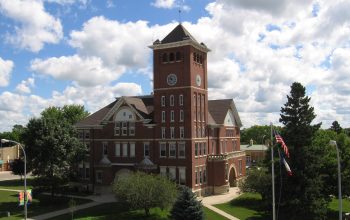Last week, Wright County’s state representatives traveled through the county, holding town hall meetings in Clarion and Belmond. District 8 representative, Terry Baxter, and District 4 senator, Dennis Guth, both Republicans, met to talk with their constituents as they have reached the midway point in the current legislative session. The Clarion event, held at the Depot, attracted around 30 people.
Both of the lawmakers first discussed various pieces of legislation that they are supporting this session. The issues that both men highlighted were included in their updates this week. See the Monitor or elsewhere on our website for these.
The rest of the meeting was taken up by questions from the audience. Several questions related to education. Someone asked a question about taxpayer funded scholarships for private schools. Under a Governor Kim Reynolds plan, the scholarships would be worth about $5,300, or 70 percent of the state funding per-student for public schools. Some in the audience voiced concerns about public funds being used for private school. Baxter noted that public funds have long been used for private education such as state funds going to institutions such as private Waldorf College.
Baxter also indicated that he thinks parents should be able to get scholarships to attend private schools if public schools are not providing “neutral education.” This triggered a conversation about obscenity in schools. Baxter voiced concerns about “indoctrination” through certain books and suggested that schools need to “clean up their curriculum.” A couple of people in the audience posited that books and curriculum should be a matter of local control that lies with school boards. Guth said school districts and boards are often not doing enough to curtail obscene materials.
Much discussion revolved around biofuels and whether they should be mandated or not. The lawmakers discussed a house bill advanced a few weeks ago that would require existing retailers with compatible infrastructure to offer E15 by 2026 from at least one dispenser. Baxter is in support of an ethanol mandate but was dubious as to why it should be the taxpayers responsibility to pay for a business to essentially do upgrades. Guth reiterated that he is largely against the fuel mandates.
The Summit Carbon Solutions pipeline came up during the questions. Someone asked Guth if he has a connection to the pipeline. Guth noted that as a landowner and a lawmaker he is opposed to the pipeline. Both he and Baxter added that they are concerned about the use of eminent domain to acquire land for the project. “I struggle with the whole thing,” said Baxter. “I don’t like a private organization using eminent domain for something that does not have public use.”
There was some discussion about the so-called “freedom act” or HF 2545. The bill specifies that businesses, governments and schools can’t fire workers based on their medical treatment status, including vaccinations. Someone was concerned about denying scientific evidence that vaccines work and that the bill creates a slippery slope where other vaccinations besides the COVID vaccination could be included. Both lawmakers voiced concerns about censorship of information when it comes to injuries coming from vaccinations. They posited that there is not enough science supporting the COVID vaccine.
In the end, both men thanked the public for their input, stressing how much they value hearing what is important to their constituents. Baxter explained that this would be his last town hall in Clarion as he is not seeking re-election in November. He noted that he will be going back to pursuing mission work full time through GoServ Global, an organization based in Eagle Grove that he helped found.


